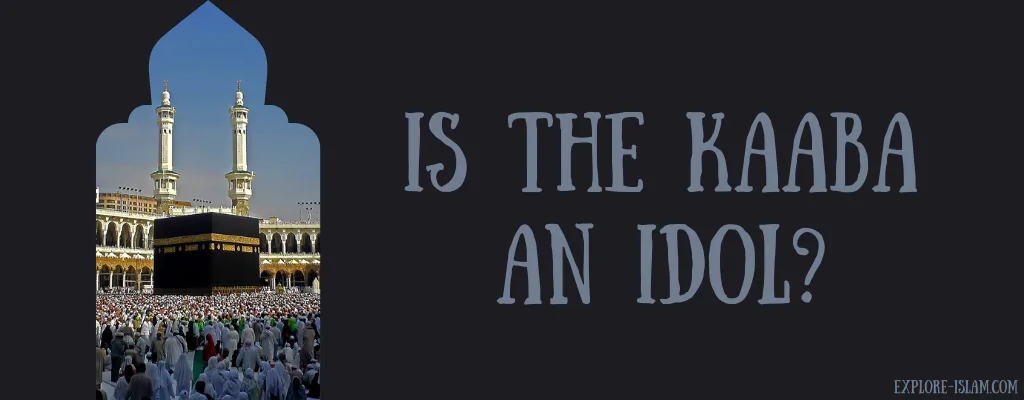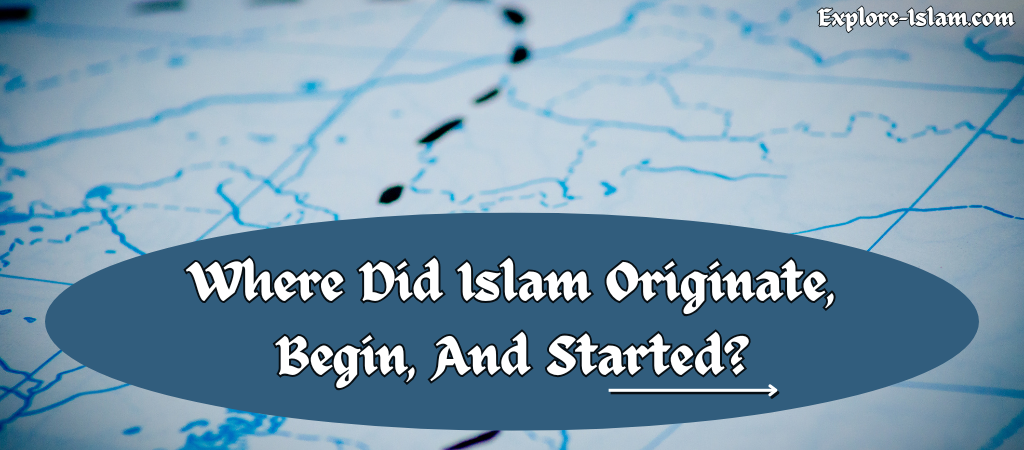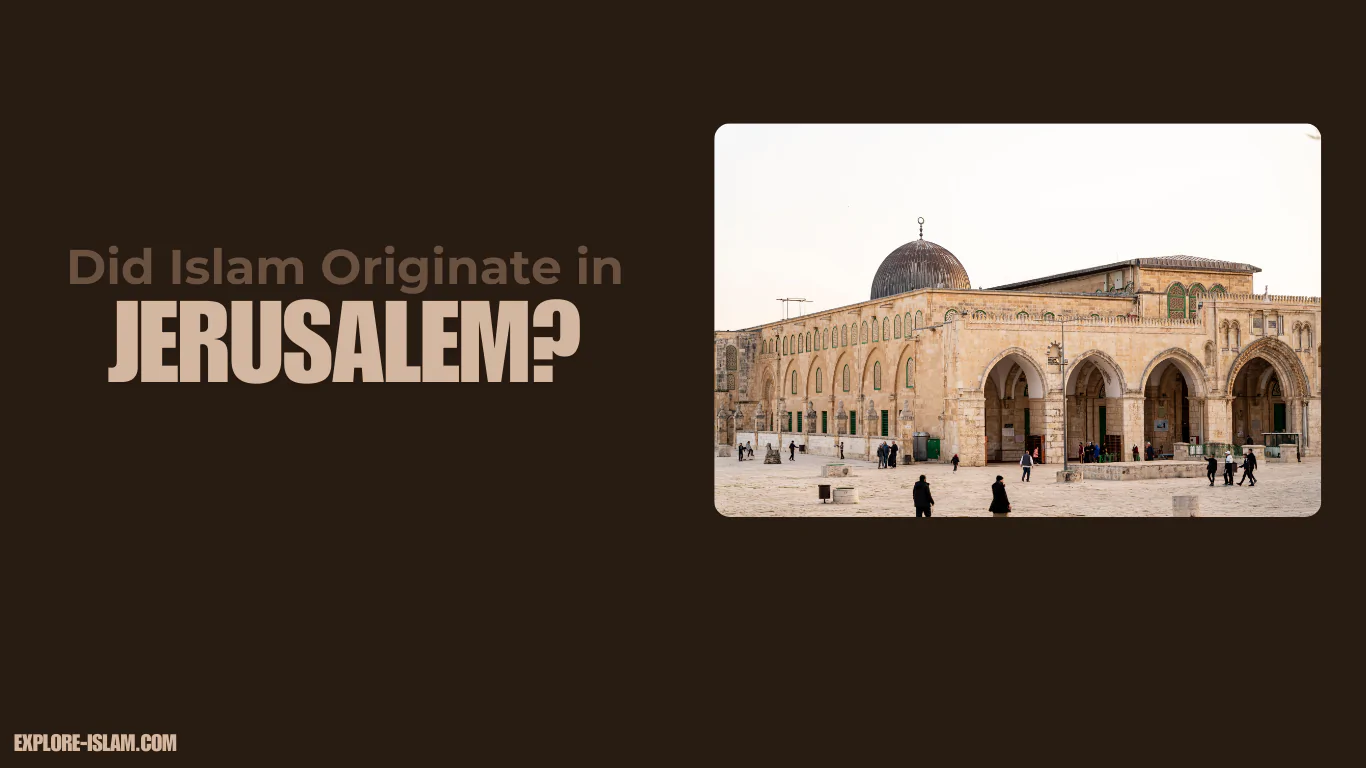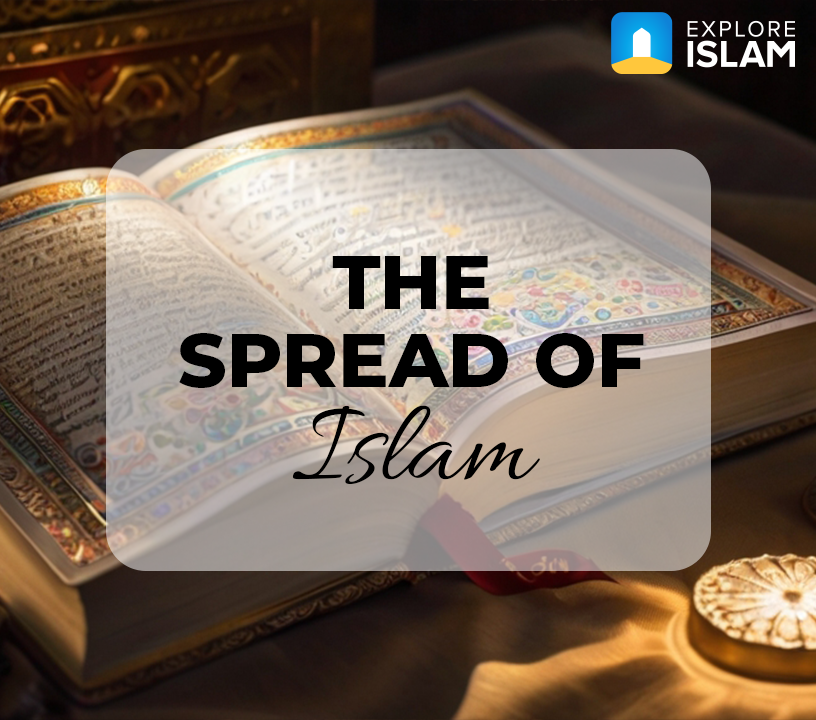Many non-Muslims get confused when the see a Muslim praying in the direction of the Kaaba. They think he/she is worshiping this black building. Moreover, they get more confused when they witness Pilgrims trying hard to touch or kiss the nearby black stone. Do not such behaviors resemble the pre-Islamic polytheistic rituals that go against the concept of God’s oneness?
In this article, we will clarify these important misconceptions regarding the status of Kaaba and Black Stone in Islam.
Here we will learn the following:
What is the Kaaba in Islam?
The Kaaba in Arabic means a cube. Kabbah in Islam is the center of the Sacred Mosque “Al-Masjid Al-Haram”, the holiest mosque for Muslims, and it is situated in Mecca, Saudi Arabia.
The Kaaba is simply a cube-shaped building made of gray stone and marble and covered elegantly with a black cloth called “Al-Kiswah” that is embroidered with Quranic verses. The Kaaba is indeed of great importance to Muslims because it is the place, to which Muslims direct themselves to in their prayers and where they travel to do Pilgrimage, the fifth pillar of Islam.
Moreover, Prophet Muhammad taught Muslims to sleep and bury their dead facing its meridian. Allah emphasizes this importance in Surah 5:
جَعَلَ ٱللَّهُ ٱلْكَعْبَةَ ٱلْبَيْتَ ٱلْحَرَامَ قِيَـٰمًۭا لِّلنَّاسِ وَٱلشَّهْرَ ٱلْحَرَامَ وَٱلْهَدْىَ وَٱلْقَلَـٰٓئِدَ ۚ ذَٰلِكَ لِتَعْلَمُوٓا۟ أَنَّ ٱللَّهَ يَعْلَمُ مَا فِى ٱلسَّمَـٰوَٰتِ وَمَا فِى ٱلْأَرْضِ وَأَنَّ ٱللَّهَ بِكُلِّ شَىْءٍ عَلِيمٌ
“Allah has made the Kaaba—the Sacred House—a sanctuary of well-being for all people, along with the sacred months, the sacrificial animals, and the ˹offerings decorated with˺ garlands. All this so you may know that Allah knows whatever is in the heavens and whatever is on the earth and that He has ˹perfect˺ knowledge of everything.”
[Quran 5:97]
Read: What is Kaaba of Islam: 7 Interesting Facts about Kaaba
Who built the Kaaba?
According to the Quran, it is Prophet Ibrahim and his son Prophet Ishmael who raised the foundations of the Kaaba, the sacred House of God, following Allah’s command to do so:
وَإِذْ يَرْفَعُ إِبْرَٰهِـۧمُ ٱلْقَوَاعِدَ مِنَ ٱلْبَيْتِ وَإِسْمَـٰعِيلُ رَبَّنَا تَقَبَّلْ مِنَّآ ۖ إِنَّكَ أَنتَ ٱلسَّمِيعُ ٱلْعَلِيمُ
“And ˹remember˺ when Abraham raised the foundation of the House with Ishmael, ˹both praying, ˺ “Our Lord! Accept ˹this˺ from us. You are indeed the All-Hearing, All-Knowing.”
[Quran 2:127]
وَإِذْ بَوَّأْنَا لِإِبْرَٰهِيمَ مَكَانَ ٱلْبَيْتِ أَن لَّا تُشْرِكْ بِى شَيْـًۭٔا وَطَهِّرْ بَيْتِىَ لِلطَّآئِفِينَ وَٱلْقَآئِمِينَ وَٱلرُّكَّعِ ٱلسُّجُودِ
“And ˹remember˺ when We assigned to Abraham the site of the House, ˹saying,˺ “Do not associate anything with Me ˹in worship˺ and purify My House for those who circle ˹the Kaaba˺, stand ˹in prayer˺, and bow and prostrate themselves.”
[Quran 22:26]
Moreover, the Kaaba is the first place of worship built to be a source of guidance, blessings and safety for humanity, serving as the symbol of unity for nations.
إِنَّ أَوَّلَ بَيْتٍۢ وُضِعَ لِلنَّاسِ لَلَّذِى بِبَكَّةَ مُبَارَكًۭا وَهُدًۭى لِّلْعَـٰلَمِينَ ٩٦ فِيهِ ءَايَـٰتٌۢ بَيِّنَـٰتٌۭ مَّقَامُ إِبْرَٰهِيمَ ۖ وَمَن دَخَلَهُۥ كَانَ ءَامِنًۭا ۗ وَلِلَّهِ عَلَى ٱلنَّاسِ حِجُّ ٱلْبَيْتِ مَنِ ٱسْتَطَاعَ إِلَيْهِ سَبِيلًۭا ۚ وَمَن كَفَرَ فَإِنَّ ٱللَّهَ غَنِىٌّ عَنِ ٱلْعَـٰلَمِينَ ٩٧
“Surely the first House ˹of worship˺ established for humanity is the one at Bakkah (Another name of Mecca)—a blessed sanctuary and a guide for ˹all˺ people. In it are clear signs and the standing-place of Abraham. Whoever enters it should be safe. Pilgrimage to this House is an obligation by Allah upon whoever is able among the people. And whoever disbelieves, then surely Allah is not in need of ˹any of His˺ creation.”
[Quran 3:96-97]
Although the early history of the Kaaba is not well known, it is certain that in the period before Islam it was a site of pilgrimage for the people throughout the Arabian Peninsula. When Muslims conquered Mecca in 630 CE, Prophet’s Mohammed restored the original status of the Kaaba as the symbol of monotheism, and ordered the removal of all 360 idols housed around the Kaaba
Over the course of the lengthy history of Islam, the Sacred Mosque has undergone numerous instances of renewal, extension, and reconstruction by numerous Muslim leaders, particularly in the last century, primarily to expand its capacity to handle the continuously growing number of Muslims and pilgrims.
What is inside the Kaaba?
Maybe you are now asking what is inside the Kaaba. The following can be found inside the Holy Kaaba:
The ceiling is supported by three wooden pillars, and there are several gold and silver lamps hanging from it as well as an enclosed stairway leading to a hatch and the Repentance Door, also known as the Golden Door. Fabric trimming and eight stones with Arabic calligraphy are also present.
Why do Muslims pray towards the Kaaba?
Muslims pray towards the Kaaba because they are simply ordered to do so by the Lord of the Heavens and Earths, as per chapter 2 in the Quran:
قَدْ نَرَىٰ تَقَلُّبَ وَجْهِكَ فِى ٱلسَّمَآءِ ۖ فَلَنُوَلِّيَنَّكَ قِبْلَةًۭ تَرْضَىٰهَا ۚ فَوَلِّ وَجْهَكَ شَطْرَ ٱلْمَسْجِدِ ٱلْحَرَامِ ۚ وَحَيْثُ مَا كُنتُمْ فَوَلُّوا۟ وُجُوهَكُمْ شَطْرَهُۥ ۗ وَإِنَّ ٱلَّذِينَ أُوتُوا۟ ٱلْكِتَـٰبَ لَيَعْلَمُونَ أَنَّهُ ٱلْحَقُّ مِن رَّبِّهِمْ ۗ وَمَا ٱللَّهُ بِغَـٰفِلٍ عَمَّا يَعْمَلُونَ ١٤٤
“Indeed, We see you ˹O Prophet˺ turning your face towards heaven. Now We will make you turn towards a direction ˹of prayer˺ that will please you. So turn your face towards the Sacred Mosque ˹in Mecca˺—wherever you are, turn your faces towards it. Those who were given the Scripture certainly know this to be the truth from their Lord. And Allah is never unaware of what they do.”
[Quran 2:144]
A Muslim is actually someone who unconditionally submits to God’s will and adheres to His teaching, the All-Wise, and the All-Knowledgeable. The direction of prayer is nothing but another order of God’s orders that Muslims must keep.
It is extremely amazing when you see the Muslims from all over the world directing themselves towards the Sacred Mosque in their prayers. You will be praying in the same direction as your Muslim brothers and sisters regardless of where you are—the North Pole, the Amazon rainforest, or the Pacific Ocean islands.
What a lovely sense of connection that transcends boundaries! No power other than the power of God, can direct such billions of people to one point at the same moment. This act reminds us of the importance of unity and that all of us, the sons of Adam and Eve, should be worshipping, the one true God, the Creator of the Heavens and Earths.
يَـٰٓأَيُّهَا ٱلنَّاسُ ٱعْبُدُوا۟ رَبَّكُمُ ٱلَّذِى خَلَقَكُمْ وَٱلَّذِينَ مِن قَبْلِكُمْ لَعَلَّكُمْ تَتَّقُونَ ٢١
“O humanity! Worship your Lord, Who created you and those before you, so that you may become mindful ˹of Him˺.”
[Quran 2:21]
What is the Black Stone?
The Black Stone, in Arabic “Al-Ḥajar al-Aswad”, is a stone placed into the eastern wall of the Kaaba. It now consists of three large pieces and some fragments, surrounded by a stone ring and held together with a silver band.
It was put there by Prophet Ibrahim and Ismail (peace be upon them both) by the order of Almighty Allah, and the purpose of it was to indicate the beginning of “Tawaf” (circumambulation of the Kaaba).
Read: What Is The Black Stone In Islam? – 2023 Guide
Is it just a normal black stone?
Read what Prophet Mohammad says about its origin:
عَنِ ابْنِ عَبَّاسٍ، أَنَّ النَّبِيَّ صلى الله عليه وسلم قَالَ “ الْحَجَرُ الأَسْوَدُ مِنَ الْجَنَّةِ ”
“The Black Stone came down from Paradise.”
[Hadith]
And in another amazing hadith,
قَالَ رَسُولُ اللَّهِ صَلَّى اللَّهُ عَلَيْهِ وَسَلَّمَ: «نَزَلَ الْحَجَرُ الْأَسْوَدُ مِنَ الْجَنَّةِ وَهُوَ أَشَدُّ بَيَاضًا مِنَ اللَّبَنِ فَسَوَّدَتْهُ خَطَايَا بَنِي آدَمَ» . رَوَاهُ أَحْمَدُ وَالتِّرْمِذِيُّ وَقَالَ: هَذَا حَدِيثٌ حَسَنٌ صَحِيح
“When the Black Stone came down from Paradise, it was whiter than milk, but the sins of the sons of Adam made it black.”
[Hadith]
Al-Muhibb Al-Tabari made a nice comment regarding last hadith: “The fact that it is black is a lesson for those who have insight. If sins can have this effect on an inanimate rock, then the effect they have on the heart is greater.”
The Prophet touched and kissed the Black Stone, and thus the Muslims followed his lead in doing so. Here is a crucial narration that clarifies any misconception regarding the worship of the black stone and provides an explanation of why Muslims value it.
حَدَّثَنَا أَبُو بَكْرِ بْنُ أَبِي شَيْبَةَ، وَعَلِيُّ بْنُ مُحَمَّدٍ، قَالاَ حَدَّثَنَا أَبُو مُعَاوِيَةَ، حَدَّثَنَا عَاصِمٌ الأَحْوَلُ، عَنْ عَبْدِ اللَّهِ بْنِ سَرْجِسَ، قَالَ رَأَيْتُ الأُصَيْلِعَ عُمَرَ بْنَ الْخَطَّابِ يُقَبِّلُ الْحَجَرَ وَيَقُولُ إِنِّي لأُقَبِّلُكَ وَإِنِّي لأَعْلَمُ أَنَّكَ حَجَرٌ لاَ تَضُرُّ وَلاَ تَنْفَعُ وَلَوْلاَ أَنِّي رَأَيْتُ رَسُولَ اللَّهِ ـ صلى الله عليه وسلم ـ يُقَبِّلُكَ مَا قَبَّلْتُكَ .
It was narrated that ‘Umar, the second caliph, came to the Black Stone and kissed it, then he said: “I know that you are only a stone which can neither bring benefit nor cause harm. Were it not that I had seen the Prophet (peace and blessings of Allah be upon him) kiss you, I would not have kissed you.”
(Hadith)
Is the Kaaba an Idol?
After reading this brief summary, it should be clear that, contrary to what some non-Muslims may believe and what certain propagandists may attempt to erroneously promote, the Kaaba and the Black Stone are not idols for Muslims. As electrons revoke around the nucleus and the earth revolves around the sun in an anti-clock manner, Muslims also during their pilgrimage and Umrah, move around the Kaaba repeating:
“God is great “, and praying “Our Lord, give us in this world [that which is] good and in the Hereafter [that which is] good and protect us from the punishment of the Fire”
What a magnificent scene of sincere worship and devotion to the one true God!
Read: Is Muslim Hajj A Sign of Tawheed or Polytheism? – How Tawheed Is Manifested in Hajj Rituals
Also, please refer to this section if you are interested to learn more about the Pillars of Islam.
This article in other languages:









